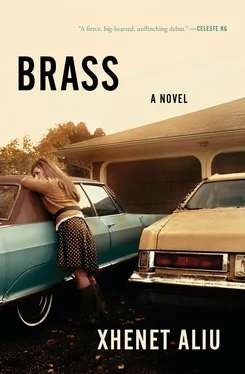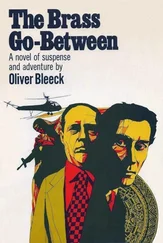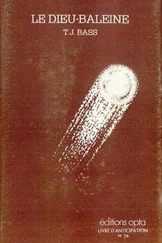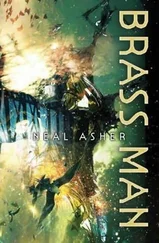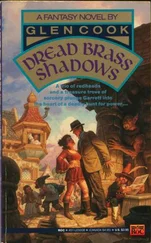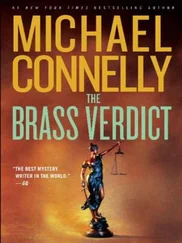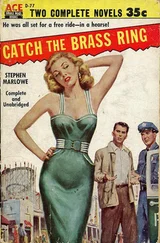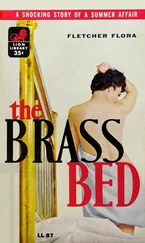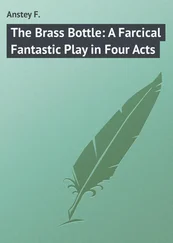“I’m not worried.”
“Then why do your eyes look like that?”
“Look like what?”
“Like they won’t look at me.”
“They will,” I said. “They’re just doing something else right now.” There was a raccoon out there, digging around in a pile of slop that had somehow ended up ten yards from the trash bins. That guy found himself a little Grade D nugget and waddled happily away with it, and I was searching for the lesson in that, coming up empty.
Bashkim opened up my hand and placed something in there, a crumpled-up Dunkin’ Donuts napkin from the glove box.
“What’s this?” I asked.
“A rose,” he said. “See?”
It was a rose, or at least a napkin origamied into a rose shape. I put it to my nose.
“Smells like Tic Tacs,” I said.
“The orange kind,” he said. “The best kind.”
“Thanks.”
“I’m sorry I have the bad moods,” he said.
“It’s okay,” I said.
“So much work, you know? I get tired.”
I nodded.
“Not tired of you. Tired of French fries. Tired of, you know, other things. Not you, okay?”
“Okay,” I said.
“We have to go,” he said.
I nodded but didn’t budge from the driver’s seat when he slammed the passenger door behind him. I just sat there with my hand on the shifter, wondering how much money Bashkim was really down, if it was really that bad, if maybe I could just write Bashkim a check and get him over the bad moods and we could get on with our lives. Then I thought about the seventeen dollars in tips I’d made that night and realized that a check from me wouldn’t get us far, maybe just enough for gas to get us to the Poconos, the only place anyone in my family had visited since they crossed the ocean forty years before and figured they’d done enough traveling for one bloodline. There might not even be enough left for a half hour in one of those heart-shaped hot tubs Uncle Eddie said the resorts have down there. Besides, my fifteen-minute break was over, and I had to go back in at least to finish the last hour of my shift, and if I was going to go through all the trouble to go back in there then I might as well just stay a while longer and try to hustle a few more bucks. That’s how these places trap you for life. But I was still thinking at that moment, Not me, and on the walk back inside I picked up a penny, heads up, and dropped it into my apron as if anything worth finding would be lying there tossed aside on the street. Good luck, that heads-up penny, as in good luck finding a million more of these in your lifetime so maybe you could pay off, say, your mother’s mortgage, or your sister’s future tuition bills, or at least treat them to a nice steak dinner at Carmen Anthony’s if the other bills were still too high. But at least that heads-up penny proved my mother wrong after all—I wasn’t out running around like a ten-dollar whore. I was a whole lot cheaper than that.
—
Mamie had never gotten the second shift she used to work out of her system, even though that pink slip from Waterbury Buckle had come long ago. She’d been working a daytime gig at the Almond Joy factory a little down Route 8 for a couple of years, but she still lived at nighttime as if she didn’t have to rise until afternoon the next day, staying up for news she perked up for only during the weather, and then late-night talk shows with guests she’d never heard of, because the only actors she ever remembered the names of were the ones nobody else on earth did, people like Joel Grey and Ben Gazzara, guys who were celebrities when life stopped for her right around the time of my birth. After the talk shows were over, the TV went off but the lamp stayed on, with no books or magazines for the light to shine on, except for a Ladies’ Home Journal with pages dog-eared on recipes none of us had ever tasted. I used to look at the chicken piccata page and wonder who would use wine as an ingredient and not a religion.
The condensed chicken soup I’d eaten for dinner used mostly salt as an ingredient, so the puke I’d just dropped into the toilet tasted pickled and burned my throat on the way up. I licked my lips until they turned in on themselves and somehow still believed, when another typhoon of nausea swirled up in my stomach, that only a sleeve of saltines could save my life. It was my body working against its own best interests, trying to turn itself into dust.
Then David Letterman said something that tore up his live studio audience, and it reminded me of the life that still existed outside of the bathroom. When we were little and Greta and I got sick, Mamie gave us Tupperware bowls to puke in and spoonfuls of brandy to make us sleepy. She’d scratch our heads and do the watusi at the foot of our beds until we cracked a smile, then she’d declare our fevers broken and make us sit up and watch Indiana Jones. That Tupperware puke bowl was long gone by then, ruined when the acids finally ate a hole through the plastic, and the closest things to brandy in our house that night were the caramelized bottoms of the empty Carlo Rossi jugs that lined our kitchen floorboards like buoys keeping our house afloat. I pulled away from the rim of the toilet and dragged myself to the doorway of the living room.
“Mamie, I’m sick,” I said.
It came out so soft that I could barely hear it, and right after the words hit the ether I hoped that the television had gobbled them up. At first I thought I’d gotten my wish, because it was half a commercial break before she even acknowledged my presence, and it was less an acknowledgment than a twitch, one of the deeper shakes that I usually made out only when I looked at her for more than a few seconds at a time, which meant not often, because it was confusing to see her start to look old. She was thirty-five. She might’ve had the beginnings of some palsy, but I wouldn’t know, because she hadn’t seen a doctor since she delivered Greta, and I’d bet money that she had to be talked into it then. It was in her hair that I noticed the twitch first, the fluffy grown-out bangs of a grown-out Ogilvie home perm swaying just a little as if there were a ceiling fan over her head. One silver ribbon ran through her brown hair like a streaker. She had the kind of soul-deep fatigue that looked sexy in photographs but in real life meant she hadn’t thought of sex in a decade.
“What do you mean, sick ?” she said. Looking at her made it worse. The light from the television was changing color with each scene, so she looked like she were under a strobe light at a disco, like somehow she’d found a bouncer to overlook her elastic-waist jeans.
“Puke-sick,” I said.
“What’d you get into?”
“Nothing.”
“You been drinking?”
“No.”
“Would it help?” She shook her empty glass at me.
“I don’t think so,” I said. I curled up on the sofa next to her, and she pulled her knees away.
“Well, don’t get me sick. I can’t afford to be sick, I’m working doubles all week,” she said. She pressed her palm against my forehead. “You don’t feel hot. You feel cool.”
I shrugged.
“Well, what do you want me to do about it?” she asked.
I thought about Indiana Jones, how long it’d been since we’d sat down and watched it.
“I don’t know,” I said. “Nothing, I guess.”
“Is it a stomach bug?”
“Maybe,” I said.
“I bet it’s food poisoning. That crap you eat at the Ross.”
“Maybe.”
“Are you pregnant?” she asked. “You don’t have a boyfriend, do you?”
“What? No. I mean, no I’m not pregnant. I kind of have a boyfriend.”
“Then how do you know you’re not pregnant?”
“Because having a kind-of boyfriend doesn’t mean you’re automatically pregnant.”
Читать дальше
